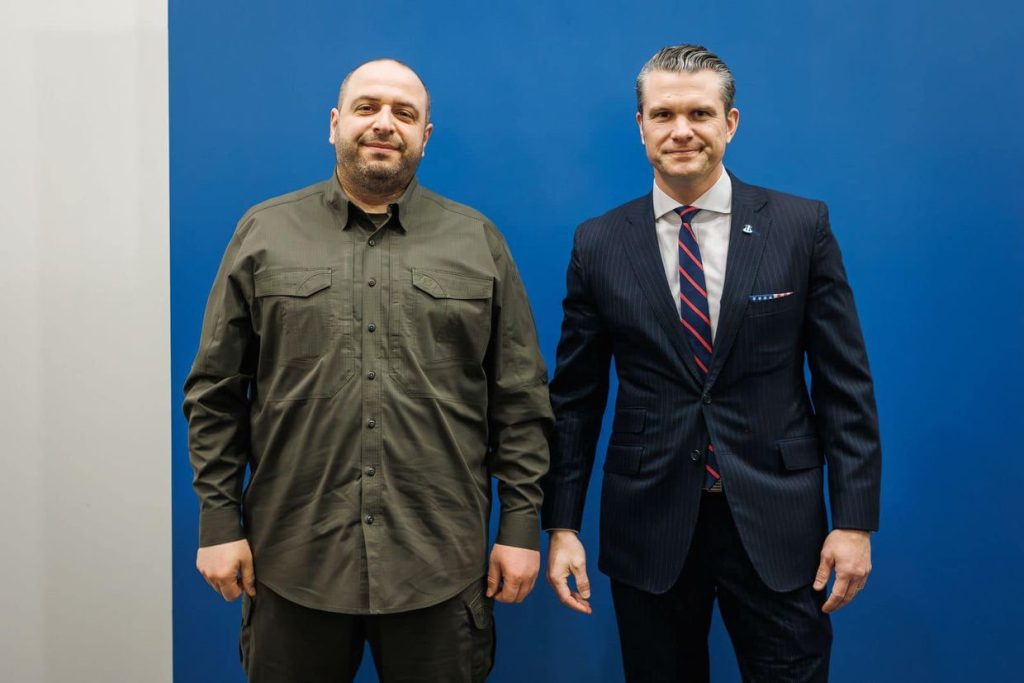Ukraine Defense Minister Meets U.S. Defense Secretary Amid Shifting Alliances
On February 12, Ukraine’s Defense Minister Rustem Umerov met with U.S. Defense Secretary Pete Hegseth for their first face-to-face encounter, a significant diplomatic event that took place on the sidelines of the Ramstein-format meeting in Brussels. This meeting, held during a critical juncture in international relations, underscored the ongoing importance of the U.S.-Ukraine alliance, especially as both nations navigate the complexities of a rapidly changing geopolitical landscape.
Ramstein-Format Meeting: A Multinational Effort for Ukraine’s Defense
The 26th summit of the Ukraine Defense Contact Group (UDCG) marked a notable shift in leadership, with the United Kingdom taking the helm for the first time, rather than the United States. This transition comes as Washington revises its foreign and security policy, a process that gained momentum following the accession of President Donald Trump to office. The Ramstein-format meeting, a crucial gathering for coordinating international support for Ukraine’s defense, has traditionally been chaired by the U.S., highlighting the nation’s pivotal role in these efforts. However, the U.K.’s chairmanship reflects a broader realignment of responsibilities and a shared commitment to ensuring Ukraine’s security and sovereignty.
Shifting Dynamics in International Alliances
The meeting in Brussels is a clear indication of the evolving dynamics in international alliances and defense strategies. As the U.S. undergoes a reassessment of its foreign policy, other nations are stepping up to fill the gaps and maintain the momentum of support for Ukraine. This shift not only demonstrates the resilience and adaptability of the international community but also underscores the need for a more distributed and collaborative approach to global security challenges. The U.K.’s leadership in this summit is a testament to its strong historic and strategic ties with Ukraine, and it signals a broader reconfiguration of power and influence in the region.
U.S. Policy Revisions and Their Implications
President Donald Trump’s accession to office has sparked significant changes in U.S. foreign policy. The administration is revising its approach to global alliances and defense commitments, which has implications for Ukraine and other partners. While the U.S. remains a key player in international security, the revisions aim to balance national interests with external commitments. This process of reassessment is not without its challenges, but it also presents opportunities for other nations to take on more prominent roles in the defense and support of Ukraine.
Collaborative Efforts and Future Prospects
The meeting between Umerov and Hegseth, along with the broader UDCG summit, highlights the ongoing collaborative efforts to bolster Ukraine’s defense capabilities. Both officials discussed a range of issues, including the provision of military aid, the coordination of multinational training programs, and strategies to counter Russian aggression. The summit also addressed the importance of economic and diplomatic support, recognizing that Ukraine’s security is not solely a military issue but a multifaceted one requiring a holistic approach.
Looking Forward: A United Front Against Security Threats
As the international community continues to adapt to new leadership and policy changes, the Ramstein-format meeting and the UDCG summit serve as crucial platforms for maintaining a united front against security threats. The transition of leadership to the U.K. is a pragmatic step that ensures the continuity of support for Ukraine while allowing the U.S. to recalibrate its broader foreign policy. Moving forward, the collective efforts and commitments of these nations will be essential in ensuring Ukraine’s stability and resilience in the face of ongoing challenges.












